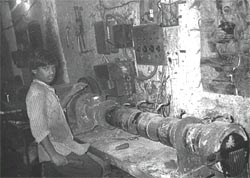Small policy
 the Union government has once again shown how indifferent it is towards the environment. A number of measures to benefit small-scale industries ( ssi s) were recently announced by prime minister Atal Bihari Vajpayee. But what was conspicuously missing, though, were policies to curb environmental threats from small manufacturing units or the possible ways of reducing their adverse effects. ssi s are responsible for an estimated 65 per cent of the total industrial pollution load.
the Union government has once again shown how indifferent it is towards the environment. A number of measures to benefit small-scale industries ( ssi s) were recently announced by prime minister Atal Bihari Vajpayee. But what was conspicuously missing, though, were policies to curb environmental threats from small manufacturing units or the possible ways of reducing their adverse effects. ssi s are responsible for an estimated 65 per cent of the total industrial pollution load.
Speaking at a conference held in New Delhi, Vajpayee recently announced a series of measures to strengthen ssi s, including raising the limits for composite loans from Rs 10 lakh to Rs 25 lakh. Industry-related service and business enterprises with a maximum investment of Rs10 lakh will now qualify for priority lending. A capital subsidy of 12 per cent for investment in technology can also be availed. The new measures also entail raising exemption limit for the ssi' s from Rs 50 lakh to Rs one crore.
Prior to the introduction of the new measures there had been talks of raising the foreign direct investment in the ssi sector from 24 per cent to 49 per cent. This could have led to technology upgradation and adoption of eco-friendly methods of production. But the government has again shied away from promoting this.
Policies to improve environment should have been there in the new measures, say experts. They could have been linked to capital subsidies. "Tax exemptions should be given to those who are willing to adopt cleaner technologies. Effluent treatment plants, for instance, are not the only answer to the pollution problem. If nothing is done soon, the new measures will only add to the pollution,' said Ravi Agarwal of Shrishti, a Delhi-based non-governmental organisation ( ngo ). He feels that the latest measures are a failure on the part of ngo s and individuals working in the field of environment.
The only answer to combat pollution lies in adopting cleaner manufacturing processes. "The new measures should have made adoption of eco-friendly manufacturing processes compulsory. In planning industrial development for the small-scale sector, environment should be given consideration. Without this development will prove to be unsuccessful,' says Agarwal.
Most of the ssi units do not adhere to pollution control norms. They usually shy away from installing effluent treatment plants as they are economically unviable due to the small scale of operation.
But ssi s are also at the receiving end of pollution control board authorities. Corruption is rampant to keep
Related Content
- Digital progress and trends report 2023
- Climate policies as catalyst for green FDI
- Farm subsidies and global agricultural productivity
- Guidelines for drinking-water quality: small water supplies
- The impacts of disasters on African agriculture: new evidence from micro-data
- Malnourished but not destitute: the spatial interplay between nutrition and poverty in Madagascar
